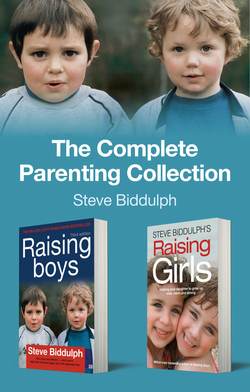Читать книгу The Complete Parenting Collection - Steve Biddulph, Steve Biddulph - Страница 74
STORIES FROM THE HEART LETTER FROM A FATHER
ОглавлениеDear Steve,
We have had many challenges with our son, and he with us! I’m pleased to say that things are going well for him. Other parents of boys might like to share some things we have learnt.
The biggest difference between Matt and his sister Sophie was that Matt was very impulsive and had explosive energy. When he was eight, he ran straight out in front of a car without even pausing to look. Luckily the driver had seen Matt’s ball roll onto the road and was already braking hard! The car just missed him. Boys don’t seem to always think before they act.
We really got it wrong with Matt in his early teens. Because his sister had been so easy to negotiate with, we assumed he would be the same. But he just didn’t do his housework, his homework, or keep to agreements about when he would be in. Reasoning wasn’t enough with him – until we realised he was crying out for firm boundaries and enforced consequences. We had been threatening him, sure, but just not carrying out consequences. When we finally did this consistently (feeling pretty mean sometimes), then he improved out of sight. The thing was, he was happier, too. I think some boys just need this.
Something that really helped Matt was the peer support scheme. In Year 6 at primary school he had a nursery child to take care of and protect. This gave him a sense of being important and he came home full of stories about his younger charge – how the little boy learnt, what he got up to. We saw a whole different side to him. Then in Year 7 at high school, he had a Year 11 peer support boy who watched out for him in a bullying situation, so he benefited both ways.
Around this time we learnt that although he was ratty at home, the teachers thought he was great at school! So it was just that he was letting off steam with us. Lots of parents I’ve talked to recognise this ‘school angel-home devil’ situation!
At around fourteen and fifteen we felt Matt was drifting into his own world – rarely talking to us, just eating and disappearing, and giving us no insight into his world of school, his friends and so on. Our only communication seemed to be in telling him off. Luckily we always eat dinner together at the table, and this was the one time we got to talk. We resolved to have more time together – father and son weekends away. My wife decided to get out of the negative cycle and to give compliments to Matt, not just criticisms. He responded quite warmly. I think we had just got caught in a negative pattern. Boys do want to be friends; they don’t want to live in their own world, which is often quite lonely.
We both benefited from a parenting course. The best things we learnt were: use ‘I messages’ (like ‘I was scared when you didn’t come home at the agreed time. I need you to make agreements you can keep.’) instead of ‘You are unreliable and useless! You had better come home or else!’; also, how to listen to kids’ problems, so they can talk them over, instead of jumping in with advice.
We are a lot happier now, and Matt is a sociable and pleasant young man, instead of a surly boy. It’s important never to give up with your kids. Keep learning and getting help if you are stuck. You can always improve things if you try. Kids really need you to keep communicating with them.
